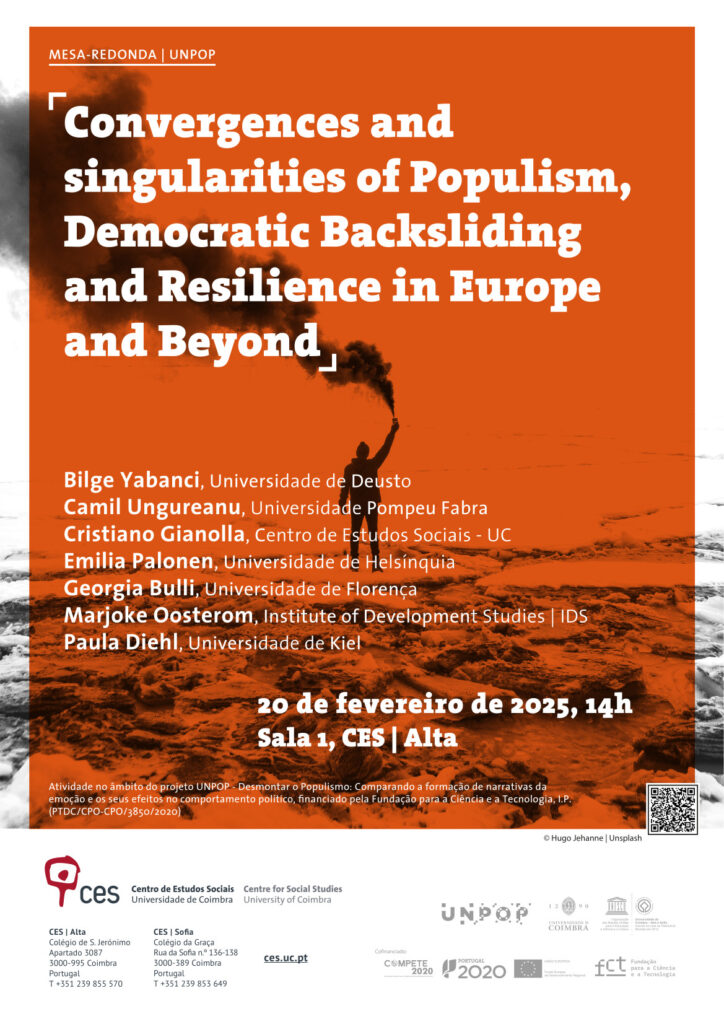L´ecologia del simbolismo femminile nell´arte e nella cultura. Riflessioni sulle radici del retrocesso democratico
11 de março de 2025, 15h30
Evento em formato digital
La tavola rotonda esplora temi legati alla rappresentazione, all’identità e al linguaggio attraverso tre interventi che affrontano questioni culturali, poetiche e terapeutiche.
Giuseppina Raggi analizza due visioni patriarcali: il corpo di Maria Maddalena e il corpo del fado. Nella prima parte, l’intervento esamina come l’arte occidentale moderna ha rappresentato Maddalena, in particolare nel contesto del “Noli me tangere”, attraverso uno sguardo teologico e visuale che interroga le tradizioni cattoliche. Nella seconda parte, si riflette sulle critiche recenti ai monumenti raffiguranti figure femminili, focalizzandosi sulla scultura Guitarra de Coimbra e il suo contesto culturale.
Mario Bolognese esplora il legame tra democrazia, eco-poesia e differenza di genere, partendo dall’esperienza della prima infanzia. La lingua materna, descritta come un fiume carsico che si inabissa nel nostro inconscio, diventa lo strumento per dissotterrare esperienze profonde e caotiche. La poesia, come la lingua materna, offre una via per dare voce al non detto, creando un linguaggio poetico capace di liberare dalle emozioni eccessive e dal dolore.
Simonetta Marucci presenta l’applicazione terapeutica dell’Haiku nel trattamento dei Disturbi del Comportamento Alimentare presso Palazzo Francisci. La scrittura e condivisione di Haiku aiutano le pazienti a esplorare le proprie emozioni e a contrastare i pensieri ossessivi. Questo approccio si integra con tecniche come la Danzaterapia e il Tai-Chi, mostrando come la poesia possa facilitare la ricostruzione identitaria e il percorso di guarigione.
Questi interventi mettono in luce come arte, poesia e terapia possano trasformare le narrazioni individuali e collettive. Cristiano Gianolla metterà in relazione gli interventi precedenti in una riflessione socio-politica che riflette sul potenziale democratico dell’arte nella cultura politica europea attuale segnata da un retrocesso democratico.
LINK ZOOM > https://zoom.us/j/85176335237 | ID: 851 7633 5237 | Senha: 166889
Notas biográficas
Giuseppina Raggi, dottore di ricerca in storia dell’arte (2005, Università degli Studi di Bologna e Universidade de Lisboa), si dedica principalmente allo studio del Settecento. Specializzata nella pittura ad affresco di quadratura, negli ultimi anni ha diretto le sue ricerche sul mecenato delle donne e delle persone africane o afrodiscendenti nell’ambito dell’architettura e delle arti in Portogallo durante l’epoca moderna (sec. XVI-XVIII). Nel 2021 ha pubblicato il libro O projeto de D. João V. Lisboa ocidental, Mafra e o urbanismo cenográfico de Filippo Juvarra e co-editato il libro Filippo Juvarra e Domenico Scarlatti e il ruolo delle donne nella promozione dell’opera in Portogallo. Nel 2022, insieme a Cristiano Gianolla, ha pubblicato un contributo sulla polemica scultura di padre António Vieira inaugurata a Lisbona nel 2017.
Mario Bolognese esplora il legame tra democrazia, eco-poesia e differenza di genere, partendo dall’esperienza della primissima infanzia, intrisa di cosmo, natura ed animali. La lingua materna – miticamente collegata con la Dea Universo – è descritta come un fiume carsico che si inabissa nel nostro inconscio. La poesia, come la lingua materna, offre una via per dare voce al non detto, creando non solo un linguaggio poetico capace di liberare energie emozionali, ma soprattutto di favorire la creazione di un nuovo eco-linguaggio di pace, non più ‘politicamente’ controllato dal ‘logos’ imperante nella geo-politica… Tra i suoi libri: Per un corpo di pace, Pedagogia, cultura rituale e non violenta del corpo (Edizioni Sapere, Padova,1995); due libri di poesia haiku: Lo stupore dell’istante (1999), Haiku dalla terra bambina (2020) e Fiabe di Eos, La Bimba, Bambine e bambini assieme sulla giostra della vita (2016, con prefazione di Luce Irigaray), editi da: Edizioni del Faro, Trento.
Simonetta Marucci, medico chirurgo, specialista in Endocrinologia. Da molti anni si occupa di Disturbi del Comportamento Alimentare, sia in ambito clinico, sia in ambito scientifico. Prof a Contratto presso Università Campus Biomedico di Roma (Scienza della Alimentazione e Nutrizione Umana- Disturbi del Comportamento Alimentare). Docente al Master di Psicobiologia della Nutrizione presso Università Tor Vergata di Roma. Autrice di pubblicazioni divulgative e scientifiche. Relatrice in numerosi Congressi sia in Italia che all’estero. Esperta in Agopuntura, Omeopatia ed Omotossicologia, da molti anni promuove l’integrazione delle Medicine Non Convenzionali e della Medicina Convenzionale, in ambito pubblico ed ha coordinato il Servizio di Medicina Integrata presso la ASL di Perugia, inserendo tecniche complementari anche nell’ambito del trattamento dei DCA. Ha inserito la scrittura autobiografica, nella forma della poesia Haiku, all’interno del percorso riabilitativo della Residenza DCA di Todi, ASL 1 Umbria.
Cristiano Gianolla integra la linea tematica ‘Democrazia, giustizia e diritti umani’ presso il Centro di studi sociali dell’Università di Coimbra. È Investigatore Principale del progetto UNPOP (FCT) e PI e WP leader dei progetti Horizon Europe PROTEMO e CO3. Ha co-fondato e coordina il ‘Gruppo inter-tematico sulle migrazioni’ e coordina i corsi ‘Teorie e istituzioni democratiche’ (PhD) e ‘Dialogo critico interculturale’ (Master) presso la Facoltà di Economia dell’Università di Coimbra. Cristiano fa ricerca su teoria democratica, populismo, narrazione delle emozioni, postcolonialismo, dialogo interculturale, cittadinanza e migrazioni.
—
Questa tavola rotonda fa parte di una serie di eventi nell’ambito del progetto UNPOP – ‘Disimballare il Populismo: Confronto tra la formazione di narrazioni di emozioni e i loro effetti sul comportamento politico’, che mira a esplorare come le narrazioni delle emozioni consentano un’analisi più approfondita del modo in cui i fenomeni populisti costituiscono e influenzano il comportamento politico.
La serie di eventi sviluppati nel corso del progetto affronta quindi diverse questioni legate alla recente crescita del populismo, concentrandosi sul ruolo delle emozioni – sia quelle considerate negative come la rabbia e la paura, sia quelle considerate positive come la speranza e l’amore – nel comportamento politico.
UNPOP è coordinato da Cristiano Gianolla e Lisete Mónico e ha sede presso il Centro di Studi Sociali e il CINEICC – Centro di Ricerca in Neuropsicologia e Intervento Cognitivo e Comportamentale dell’Università di Coimbra, ed è finanziato dalla Fondazione per la Scienza e la Tecnologia del Portogallo (PTDC/CPO-CPO/3850/2020).



